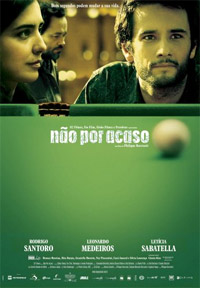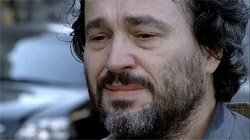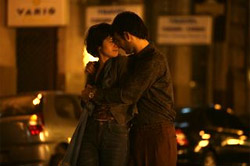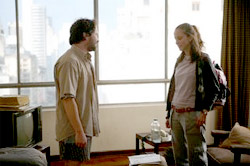 Gridlocked: Not By Chance (2007, Dir. Philippe Barcinski):
Gridlocked: Not By Chance (2007, Dir. Philippe Barcinski):
“We are all particles. We move. That’s what we do. We attract and repel.”
— Enio, Not By Chance
What does it say about world cinema when the latest export from Brazil (São Paulo, to be exact) could easily be mistaken for a Wong Kar-Wai movie? Perhaps everything, perhaps nothing. When a film like Mongol borrows its aesthetic and plotting from Gladiator, and a Thai film like The Unseeable (which I caught at the recent Asian-American film festival) is more M. Night Shyamalan than Bangkok Dangerous (getting remade as a Nic Cage potboiler, by the way), it’s clear that filmmaking’s cultural and ethnic boundaries are breaking down, or going very gray.
As a believer in Mikhail Bakhtin’s theories on multivocality, though, I’m all for these collisions of time and place and influence. If other arts have become a goulash of influences and stolen motifs, why not do the DJ mash and revel in the odd combinations that result when you throw everything in?
Which is not to say that Not By Chance, the first feature-length film by shorts director Philippe Barcinski, is a confused mess. In its precise intersection of individuals and tragic events, it’s Crash minus the hysterics. In its laid-back romanticism, it’s an antidote to recent Brazilian films like City of God which launched Mean Streets-style filmmaking into the stratosphere with its presentation of a lawless, bombed-out São Paulo. Not By Chance is São Paulo rehabilitated as urban wonderland, sometimes dangerous, oftentimes lonely, but with a hint of reconciliaton at the end of the road.
 Yes, road: streets and stoplights and traffic jams are the province of Enio (Leonardo Medeiros), a supremely competent but otherwise socially withdrawn traffic controller who holds the fate of the city’s daily traffic in his hands. From his lonely darkened outpost, he presides over every intersection in the city via spycams and computer readouts of avenues and alleys, playing God to motorists everywhere. Waxing poetically about the fluid dynamics of traffic, this sad-sack soul is a dead ringer for the intelligent, lost bachelors who populate Wong Kar Wai movies –- a man lacking connections to everything, including himself. What he needs is a random element in his personal fluid formula, and that element arrives in the form of his chipper daughter Bia (Rita Batata). When Enio’s ex-wife is killed in a traffic accident, Bia shows up on his doorstep, and he is energized by her spontaneity even as he is frightened by it.
Yes, road: streets and stoplights and traffic jams are the province of Enio (Leonardo Medeiros), a supremely competent but otherwise socially withdrawn traffic controller who holds the fate of the city’s daily traffic in his hands. From his lonely darkened outpost, he presides over every intersection in the city via spycams and computer readouts of avenues and alleys, playing God to motorists everywhere. Waxing poetically about the fluid dynamics of traffic, this sad-sack soul is a dead ringer for the intelligent, lost bachelors who populate Wong Kar Wai movies –- a man lacking connections to everything, including himself. What he needs is a random element in his personal fluid formula, and that element arrives in the form of his chipper daughter Bia (Rita Batata). When Enio’s ex-wife is killed in a traffic accident, Bia shows up on his doorstep, and he is energized by her spontaneity even as he is frightened by it.
 The second plot thread revolves around twentysomething Pedro (Rodrigo Santoro), son of a pool table manufacturer, young and in love and content with his modest lot, ready to inherit his father’s business even as he dreams of competing in pool tournaments. He whiles away the time by calculating every possible shot he can take on a pool table, dissecting a complete game into a series of geometric equations. When the accident that claims the life of Enio’s ex-wife also leaves Pedro bereft, he seeks solace in a most unusual place -– beautiful, upscale commodity trader Lucia (Leticia Sabatella), an expert at coffee beans who could use a break from her own overcaffeinated lifestyle.
The second plot thread revolves around twentysomething Pedro (Rodrigo Santoro), son of a pool table manufacturer, young and in love and content with his modest lot, ready to inherit his father’s business even as he dreams of competing in pool tournaments. He whiles away the time by calculating every possible shot he can take on a pool table, dissecting a complete game into a series of geometric equations. When the accident that claims the life of Enio’s ex-wife also leaves Pedro bereft, he seeks solace in a most unusual place -– beautiful, upscale commodity trader Lucia (Leticia Sabatella), an expert at coffee beans who could use a break from her own overcaffeinated lifestyle.
Not By Chance is a slick affair -– the opening helicopter shots of the city, with the film’s titles floating by on the sides of skyscrapers, are a direct lift from David Fincher’s Panic Room, and suggests that we might be in for a heavy-handed thriller or drama. We’re spared from such a fate, although Barcinski sometimes gets a little cute. At one point, a character’s fate is decided when she decides to run out of the house instead of tarry for two seconds, and like a photographic afterimage, we see what would have happened if she lingered for those extra two seconds — it’s an episode of Hesitate, Lola, Hesitate. All the usual elements of urban fantasia are in place: snapshots of lovers that gain totemic significance, a burnished afternoon spent at the local park, the idea that a career-minded businesswoman would fall for a young ne-er-do-well in the span of a single day. But above all, Barcinski is a graceful director, his short-film training making him adept at indicating a cliché and moving on before we’re overcome by the hoariness of it. Like Wong Kar-Wai, he is a breezy humanist: none of these characters are necessarily complex, and yet he has sympathy for them as they tend to life on their own obsessive terms. While Wong’s plots are overwhelmed by saturated cinematography and his characters’ oblique ruminations, Barcinski is more of a straight shooter. He shoots in simple, unadorned yet attractive style; best are the passages in which characters are allowed to walk in and out of focus, their intimate moments crystallized seconds at a time.
 The subplot involving Enio and Bia fares better, with Medeiros and Batata enjoying a bemused, touching chemistry, although if you can’t see its conclusion from a hundred miles off (hint: traffic controller), you need to bone up on your clichés. More interesting is how the two story threads converge at the end, but not in the way you might think. Not By Chance concludes with a thermos of coffee on a doorstep, and two people biking down an inner-city freeway –- in other words, transport this film to Hong Kong, New York, or virtually any other metropolis in the world, and you would have the same exact impact (although to be fair, maybe it wouldn’t be as sensual or hip without the Brazilian pop and electronica soundtrack). If you see the universality of Not By Chance as a sign that the world is becoming one great mass of McDonald’s-like conformity, I couldn’t necessarily argue with you; but I hold out hope that even a movie that refers to other movies from other places can find its own identity, and its own little slice of heaven.
The subplot involving Enio and Bia fares better, with Medeiros and Batata enjoying a bemused, touching chemistry, although if you can’t see its conclusion from a hundred miles off (hint: traffic controller), you need to bone up on your clichés. More interesting is how the two story threads converge at the end, but not in the way you might think. Not By Chance concludes with a thermos of coffee on a doorstep, and two people biking down an inner-city freeway –- in other words, transport this film to Hong Kong, New York, or virtually any other metropolis in the world, and you would have the same exact impact (although to be fair, maybe it wouldn’t be as sensual or hip without the Brazilian pop and electronica soundtrack). If you see the universality of Not By Chance as a sign that the world is becoming one great mass of McDonald’s-like conformity, I couldn’t necessarily argue with you; but I hold out hope that even a movie that refers to other movies from other places can find its own identity, and its own little slice of heaven.

